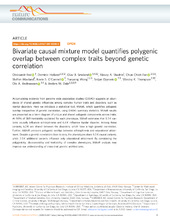Bivariate causal mixture model quantifies polygenic overlap between complex traits beyond genetic correlation
Frei, Oleksandr; Holland, Dominic; Smeland, Olav Bjerkehagen; Shadrin, Alexey A.; Fan, Chun Chieh; Maeland, Steffen; O'Connell, Kevin S.; Wang, Yunpeng; Djurovic, Srdjan; Thompson, Wesley Kurt; Andreassen, Ole Andreas; Dale, Anders
Peer reviewed, Journal article
Published version

Åpne
Permanent lenke
https://hdl.handle.net/1956/22357Utgivelsesdato
2019-06-03Metadata
Vis full innførselSamlinger
Originalversjon
https://doi.org/10.1038/s41467-019-10310-0Sammendrag
Accumulating evidence from genome wide association studies (GWAS) suggests an abundance of shared genetic influences among complex human traits and disorders, such as mental disorders. Here we introduce a statistical tool, MiXeR, which quantifies polygenic overlap irrespective of genetic correlation, using GWAS summary statistics. MiXeR results are presented as a Venn diagram of unique and shared polygenic components across traits. At 90% of SNP-heritability explained for each phenotype, MiXeR estimates that 8.3 K variants causally influence schizophrenia and 6.4 K influence bipolar disorder. Among these variants, 6.2 K are shared between the disorders, which have a high genetic correlation. Further, MiXeR uncovers polygenic overlap between schizophrenia and educational attainment. Despite a genetic correlation close to zero, the phenotypes share 8.3 K causal variants, while 2.5 K additional variants influence only educational attainment. By considering the polygenicity, discoverability and heritability of complex phenotypes, MiXeR analysis may improve our understanding of cross-trait genetic architectures.
